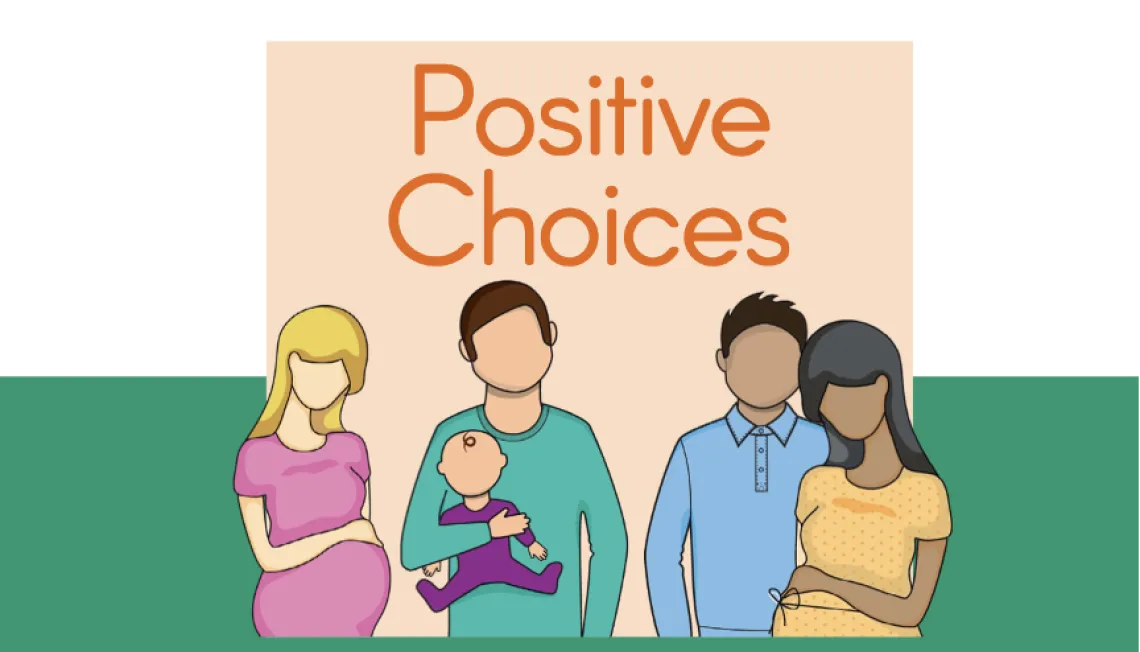We spoke to Joanna Dunkley-Pritchard and Donna Hildred, (Family Intervention Team Manager & Family Intervention Team Senior key worker) about the Positive Choices service.
About Positive Choices
Positive Choices supports young people who are care experienced or otherwise vulnerable in order to prevent their children coming into care. There are a multitude of reasons as to why a child is taken into care, but the programme aims to support parents through their challenges and improve their parenting skills. Positive choices aims to keep birth parents and babies together safely by improving the quality of the support provided to vulnerable parents. They work both antenatally and postnatally, with support offered for up to two years post-birth. The service aims to start working with parents as early on in the pregnancy as possible. The evaluation, which is discussed below, found that earlier intervention led to higher chances of successful outcomes including better adult/child interactions.
The support Positive Choices offer covers three main areas. The first element encourages parents to look introspectively by completing reflective work. Practitioners assist parents to explore personal challenges and envision what kind of life they want for their child. The second element is educational. Parents attend programmes and courses to provide them with information needed to understand what a baby's development should look like and how to keep them safe and happy. Programmes are delivered by the practitioners and include bonding between parents and babies, checking to ensure their baby is healthy, bathing, feeding, holding, attachment as well as learning about their baby's brain development. The final element is practical support. This includes helping parents to access benefits, signposting parents to different childcare options and assisting with housing conditions.
Once the baby has been born there is an 8-week post-birth programme. This focuses on mother-baby bonding, listening out for and understanding cues, tummy time, safe sleeping and helping parents to cope with crying. The service also aims to educate parents on the effects of domestic violence and frequent arguing when in front of babies and children. During the 8 weeks the team also offers practical assistance including support with registering the baby's birth and ensuring benefit applications are submitted. The programme is designed to be intensive. During pre-birth the team will see each family once a week and after the baby’s born this increases to two or three times a week.
About the team
Each family is provided with a key worker who all have protected caseloads, they ensure this key worker is consistent and if they are unavailable for any reason the family is visited by another key worker who they know and trust. This aims to minimise stress for parents and build a more trusting relationship. There are currently 3.5 full-time practitioners who work with the families; one family practitioner sits in the Early Help Hub and is key to ensuring people who could benefit from the service are referred.
The intensity of the support offered means that during a high-risk phase, the team can be reliable and present in the parents' lives. Once the parent is out of the high-risk phase, the support can taper off to allow the parent to live independently. They encourage parents to shift their outlook from one of presumed failure to one of hope for lasting change. If the decision is made that the child will be removed at birth, Positive Choices continues to work with a parent, ensuring they are supported during the period of time after the decision through Change Together.
Eligibility and Referrals
Referrals all come from children's social care. If the pre-birth assessment establishes that the parents are vulnerable, they’re then referred over to Positive Choices. Prior to 2021 referrals only came from first time parents, this was adapted after to include parents who have had a child already removed from their care.
This means the team works with any vulnerable people who meet the risk factor criteria and are at risk of having their unborn child removed from their care. The criteria at referral are:-
vulnerable young people under 25 who have a viable pregnancy at high risk of unborn being removed, care leavers up to 25, young people who are themselves in care at time of pregnancy and any vulnerable person of any age meeting the risk factor criteria. They now also work with any person who has had previous children removed and currently have no children living with them. Those who choose to stop receiving support are able to be referred back in for up to three years after the case is closed. High risk parents are usually considered so because of their history of involvement with children's social care.
Evaluation
Positive Choices has been evaluated 3 times, with the most recent evaluation published in August 2021 by the Institute of Public Care at Oxford Brookes University. This was a 12-month extension study of an evaluation completed in 2020. One of the key findings from this research was that intervention before birth was influential in improving the quality of attachment between carers and their children. Over a 4-year period from 2017-2021 66% of parents supported by Positive Choices were able to keep their babies.
The 2020 evaluation found that after engaging with key workers, fewer children needed ongoing social care interventions. The financial benefit of the programme is also detailed in the 2020 evaluation. A conservative estimate for the money saved over a 3-year period (2017-2020) of Positive Choices is £781,744. During the same period the cost to the Department of Education for delivering the programme was £444,000.
Future
To learn more about Positive Choices, please contact Joanna or Donna at joanna.dunkley-pritchard@calderdale.gov.uk or donna.hildred@calderdale.gov.uk
Case study by Leontine Gnaly, 2023.
